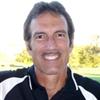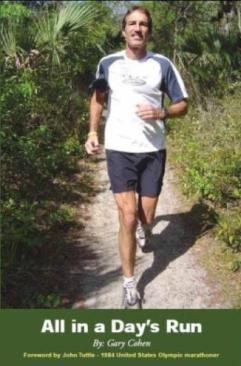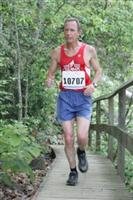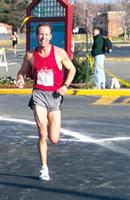|
|
|
 garycohenrunning.com
garycohenrunning.com
be healthy • get more fit • race faster
| |
|
 
"All in a Day’s Run" is for competitive runners,
fitness enthusiasts and anyone who needs a "spark" to get healthier by increasing exercise and eating more nutritionally.
Click here for more info or to order
This is what the running elite has to say about "All in a Day's Run":
"Gary's experiences and thoughts are very entertaining, all levels of
runners can relate to them."
Brian Sell — 2008 U.S. Olympic Marathoner
"Each of Gary's essays is a short read with great information on training,
racing and nutrition."
Dave McGillivray — Boston Marathon Race Director
|
 |


|
| John Tuttle was a member of the 1984 United States Olympic team in the marathon.
He finished third in the Olympic Trials Marathon behind Pete Pfitzinger and Alberto Salazar with a time of 2:11:50.
He also finished third overall at the 1983 New York City Marathon in his personal best marathon time of 2:10:51.
He is a 1981 graduate of Auburn University where he raced personal bests of a 1:49.54 800 meters, 3:43.94 1,500 meters,
4:01.9 mile and 8:35.74 3,000 meter steeplechase for the Tigers.
Tuttle was a five-time SEC Champion in track and field and a four-time All-SEC cross country runner. He graduated from
Alfred-Almond High School (New York) in 1977 where highlights included a Penn Relays 2-mile victory in 8:57.2 and a New York
Class C State Cross Country Championship in 1976. He also won the 1977 New York State Indoor mile and 1000 yard runs,
singlehandedly leading Alfred-Almond to a team State Championship. His personal best times include: 5k – 13:45; 10k(track) – 28:45;
10k(road) – 27:51; 15k – 44:09 and half marathon – 1:03:19. John was the 1999 Runners World Masters Runner of the Year and earned
USATF Masters Age Division Runner of the Year titles in 1999, 2000, 2005 and 2006. Tuttle resides in Douglasville, Georgia and has
two sons, Joshua and Michael. John took time to answer some questions for www.garycohenrunning.com in July, 2008. |
|
| GCR: | You experienced great racing success in high school, college and post-collegiately. Most runners of your caliber retire from competitive racing and run for fitness as they get older. What keeps you motivated to race as a top age grouper? |
| JT | I never felt like I reached a standard that was my highest goal. I was hungry for more. Now that I don’t have much of a shot on a high level, I set goals relative to my health condition after dealing with atrial fibrillation. |
|
| GCR: | Shortly after you turned 40, you set the following U.S. Masters records: 5k – 14:19; 8k – 23:25; 10k – 29:26 and 12k – 36:12. How exciting was it to compete against your own age group and to break records at multiple distances? |
| JT | During that period of time I was running well and I was confident within the arena of competition. It was a natural high every race because something big might happen. I always wanted to be the man, and at that point I was the MAN. |
|
| GCR: | As you approach age fifty, when you are now in good 5k racing shape a 5:00 pace per mile is very good. Does it seem strange when you realize you ran a marathon which is over eight times as long at that pace when you were at your peak in your mid-twenties? |
| JT | Yes, it sure is. My mind thinks that pace is cruising pace; then my body says something different. It's actually kind of depressing. Its real bad, when people beat me every which way but side ways and I know not too long ago it would have been the other way around. |
|
| GCR: | In recent years you have concentrated on 5k and 10k racing, occasionally stepping up to a half marathon. Do you have any desire to embark on marathon training to see what you can still do at that distance? |
| JT | Hmmmm, that’s always been a tough one... the marathon. I continue to tell myself that for me to run a marathon at my desired level I'd have to train like a animal. For me that would take time, plus I wonder if the rhythm of my heart would get messed up again if I tried to train that hard |
|
| GCR: | What is typical in your training plan now that keeps you racing at a top level? |
| JT | I run about 60 miles a week with two speed sessions. One session is on the track, if not both. I like to race two to three times a month now that I am getting older. The frequent racing keeps me sharp. |
|
| GCR: | You have had some health issues in recent years with atrial fibrillation. How does this affect your overall health and ability to train and race? |
| JT | It has had an extreme negative effect. When it initially occurred, I couldn’t do hard speed workouts and long runs or there was a chance I'd go into a-fib. Then for over a year I could only run 20 to 30 minutes per day easy. As a result of two atrial ablations and a weak training program I’ve lost my high oxygen uptake, strength and stamina base. On a positive note, recently I have been able to start more intense training and speed sessions similar to what I did in my pre-atrial fib days. |
|
| GCR: | It’s been 24 years since you were a member of the U.S. Olympic team in the marathon. If you close your eyes does it seem both a short time and a long time ago? |
| JT | I can still see myself running with Alberto Salazar and Pete Pfitzinger. Now it seems like a long time ago when someone introduces me as a 1984 Olympian. It makes me feel ancient. |
|
| GCR: | Two years after graduating from Auburn University, you took to marathon racing like a duck to water. In less than a year during 1983 and 1984 you raced 2:14 at Florida Festival, 2:12 at Grandma’s, 2:10 at New York and 2:11 at the Olympic Trials. What were the major training factors that helped you to race so well so often and to maintain mental focus? |
| JT | Well, I had a lot of people supporting me and great people to train with. Dr. Martin invited me to a top national marathon training camp. I took down notes regarding sublects ranging from training to weight lifting to diet. I really liked what Coach Billy Squires had to say. He had designed this 21 day cycle for marathon runners that made lots of sense. He also coached Bill Rogers, Greg Myers and the entire Boston Track Club and that whole group was racing well. I talked things over with my Dad and we tweaked the plan a little. Mentally, running fast allowed me to make money and to train full time, so I was motivated to race often and race well. |
|
| GCR: | At the 1984 Olympic Trials Marathon, Alberto Salazar, Greg Meyer, Tony Sandoval and Bill Rodgers were on everyone’s short list to make the team. You were one of the top fifteen competitors coming into the race, but not a favorite to make the team. How exciting was it as you crossed the finish line in third place and realized you were going to the Olympics? Did you know that fourth place finisher Dave Gordon was only nine seconds behind you? |
| JT | Yes, I was pumped up the last three miles and when I made the team it was a real high. As far as Dave Gordon behind me in fourth, I was never worried. At the 26 mile point Pete Pfitzinger and Alberto Salazar kicked and I sort of cruised in. I knew I wasn’t beating them and I knew nobody was catching me. |
|
| GCR: | You suffered an injury in training that forced you to drop out of the 1984 Los Angeles Olympic Marathon prior to the 20-mile point. How disappointing was this? In retrospect, do you wish you had jogged in and finished in front of the crowd? |
| JT | I had an injury that was a tendon on the inside of my ankle which was corrected was Spenco insoles a week or two after the Olympics. The ankle injury was annoying, but I was able to show high fitness to the satisfaction of Olympic distance coach Bill Dellinger at the pre-Olympic Santa Barbara training camp where I trained with Pete Pfitzinger. So I was in shape and ready to race well at the olympics. I was upset at not being able to finish strong and within my capabilities. I do remember thinking at the time it would be better not to finish slow and way back. I thought That would be embarrassing to me and to my family of seasoned runners. In retrospect, I should have finished and jogged and walked it in. |
|
| GCR: | In the summer of 1983 we trained together in the Florida heat and humidity, never running over nine miles at a time. You did maintain mileage in the nineties per week by doing many double workouts. Then with a month’s training in cooler climates and two 20-mile long runs, you ran your PR 2:10:51 for third place at the New York City Marathon. What did you learn from that summer’s training that helped you at New York and the following spring’s Olympic Trials marathon? |
| JT | To tell you the truth, Florida was hot. I mean mad dog hot! Yes, training in Florida made everywhere else an easy place to train. If you remember, after that summer of training in the heat and humidity is when I went to Colorado Springs for the marathon training camp. Well, I ran the legs off of everyone even though it was at altitude. You know why - because there is nowhere tougher to train then Florida in July and August. |
|
| GCR: | Like many top runners, you raced well at all distances from the mile through the 5k and 10k up to the marathon. You were even a top collegiate steeplechaser. What is your favorite racing distance? |
| JT | That depends on my fitness level. If I am in marathon shape, my favorite distance is definitely the marathon. If not, I like the 8k distance. |
|
| GCR: | You raced extremely well at distances from 800 meters to the mile at Auburn, winning SEC Indoor titles in the 1000 meters in 1978 and the mile in 1980. You also were a member of two SEC champion 2-mile relay teams in 1978 and 1980. Additionally, you were the SEC 1980 Outdoor Champion at 1,500 meters. Was there any discussion with your collegiate coach of your moving up to 5,000 meters or 10,000 meters especially in light of your performances at longer distances after college? |
| JT | When I was at Auburn, I trained like a miler (not a fast one). I ran cross country mostly to get ready for track season. Auburn had two super long distance runners in Tom Graves and Chris Fox who I wasn’t going to beat. We also had a lot of 30:00 to 30:30 competitors in the 10,000 meters. Auburn needed me in the middle distance events for team points. Auburn was also very interested in the relay events and it allowed me to travel and compete more as a miler and member of the 2-mile relay team, which I liked. |
|
| GCR: | During your senior year at Alfred-Almond High School you were involved in an epic Penn Relays 2-mile race in 1977. You won in 8:57.2, followed closely by Tom Grimes in 8:58.2, Tom Camien in 9:00.2 and John Gregorek in 9:02.0. What are your memories of that historic battle? |
| JT | I didn’t run the two-mile often in high school so I remember that my plan was to hang back and let others set the pace. John Gregorek, who was a junior, led us during the first mile and I felt great going through the mile in 4:31. I was in fifth place with a lap to go and started moving up on the curve. With 300 meters to go I had moved into third place and the pace had increased considerably. I came off of the last turn and took the lead. I was pumped up and ran the last lap in 58 or 59 seconds. Knowing what I know now I should have taken off earlier and went for time. |
|
| GCR: | You have two sons who have competed in sports including soccer and running. How have they progressed athletically? Do they exercise for fitness now or are they competitive athletes? |
| JT | They tell me that running is ''Dad's sport.'' Michael has made the Georgia Olympic development soccer team many times. Josh is enjoying college at Georgia Tech and plays soccer for fun. |
|
| GCR: | Outside of running, you have had a career as a middle school teacher and currently work with troubled and disadvantaged youth to help them turn their lives around. How rewarding have both of these vocations been? |
| JT | It is a great feeling to help someone that was harmful to society morph into a productive person. That’s what it’s all about- helping others. |
|
| GCR: | In your younger days you were known to be the life of the party and to have an energy level matched by few. Have you slowed down in recent years? |
| JT | Yes I have mellowed out a bit, but it took a while. Oh, I still have fun - but it is more controlled. |
|
| | Inside Stuff |
| Hobbies/Interests | Running, kayaking and motorcycles |
| Nicknames | Tuttle, King Tut, turtle |
| Favorite movies | ‘Gladiator,’ ‘Rambo: First Blood,’ ‘The Good, The Bad and The Ugly’ and ‘Caddyshack’ |
| Favorite TV shows | ‘Family Guy’ |
| Favorite songs | ‘Mother, Mother’ and ‘Born to be Wild’ |
| Favorite books | ‘Shogun,’ and ‘Long Way Around’ |
| First car | 1976 Oldsmobile Cutlass |
| Current car | Toyota Tundra, some motorcycles, BMW 1150, Gold Wing |
| First job | Garbage man |
| Favorite meal | Salmon |
| Favorite breakfast | Egg sandwich |
| Family | Two sons, Josh and Michael |
| First running memory | In cross country, kicking to win the 10 year old and under AAU meet |
| Running Heroes | Nick Rose, Billy Mills, Bill Rodgers |
| Greatest running moment | Setting the Masters World Record 12k at the Outback 12k in Orlando. It was perfect |
| Worst running moment | Six minutes before the SEC Indoor two-mile relay I took my sweats off and only had a jock on! I had to borrow my roommate’s shorts as he laughed uncontrollably. I came out of a crowded race to get the stick. Pre-race troubles aside, I raced strong and we won |
| Childhood dreams | To be a great athlete in baseball or running |
| Funny memories | Too many |
| Embarrassing moment | I was doing some public speaking and, unbeknownst to me, my fly was down |
| Favorite places to travel | Great Britain |
|
|
|
|
|
|